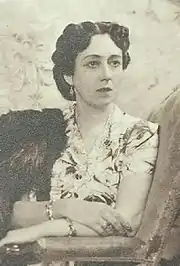Irina Mikhailovna Raievskya
Irina Mikhailovna Raievskya (Russian: Раевская, Ирина Михайловна; 18 August 1892 – 22 January 1955), was a Russian and German noble. She was Duchess of Mecklenburg by her marriage to her second husband, George, Duke of Mecklenburg (German: Georg Herzog zu Mecklenburg), who was the head of the House of Mecklenburg-Strelitz from 1934 until his death in 1963.[1] Irina is the great-grandmother of Sophie, Princess of Prussia, wife of Georg Friedrich, Prince of Prussia, current head of the House of Hohenzollern.[2]
Irina Mikhailovna Raievskya | |
|---|---|
| Duchess of Mecklenburg | |
 | |
| Born | 18 August 1892 Tsarskoye Selo, Saint Petersburg, Russian Empire |
| Died | 22 January 1955 (aged 62) Sigmaringen, Germany |
| Buried | Einsiedlerkapelle, Inzigkofen |
| Noble family | Rayevski (by birth) Tolstoy (by marriage) Mecklenburg-Strelitz (by marriage) |
| Spouse(s) | Count Alexander Mikhailovich Tolstoy
(m. 1915; died 1918) |
Issue
| |
| Parents |
|
Early life
She was born on 18 August 1892 in Tsarskoye Selo, Saint Petersburg, Russian Empire, into the highest ranks of Russian nobility. Her parents were Mikhail Nikolaievich Rayevsky (1841–1893) and Princess Mariya Grigoryevna Gagarina (1851–1941). Her paternal grandparents were Nikolas Nikolajewitch Rayevsky (1801–1843) and his wife Anna Mikhailovna Borozdine (1819–1883). Her maternal grandparents were Grigory Gagarin (1810–1893) and his wife, Sophia Andreievna Dachkov (1822–1908). Irina was daughter of the Rayevski family, who were one of heirs of the famed Grigori Potemkin (1739–1791), Prince of Tauria, descending from the childless Prince's sister Maria Alexandrowna Potemkina (1726–1774).
Marriages and children
Irina Mikhailovna Raievskya was married firstly in Saint Petersburg, Russian Empire, on 5 November 1915 to Count Alexander Mikhailovich Tolstoy (1888–1918),[3] son of Count Michael Tolstoy (1845-1913) and his wife Princess Olga Alexandrovna Vassiltchikov.
The children of her first marriage were:[4]
- Countess Irina Aleksandrovna Tolstaya (1917–1998); married Franz Ferdinand, Prince of Isenburg (1901–1956)
- Count Mikhaïl Alexandrovitch Tolstoy (1918–2004); married Francine Paule Yvonne Bregentzer (1923–2009)
After Irina was widowed on 2 October 1918, she was married secondly in Geneva, Switzerland, on 7 October 1920 to George, Duke of Mecklenburg (1899-1963),[5] son of Duke Georg Alexander of Mecklenburg-Strelitz (1859–1909) and his wife, Natalia Feodorovna Vanljarskaya, Countess of Carlow (1858–1921).
The children of her second marriage were:[6]
- Georg Alexander, Duke of Mecklenburg (1921–1996); married Archduchess Ilona of Austria (1927–2011)
- Duke Alexander of Mecklenburg (born and died 1922)
- Duchess Helene of Mecklenburg (1924–1962); married Hassan Sayed Kamil, an Egyptian-Swiss arms dealer (1918–1991).[7] She was killed in a plane crash.
- Duke Carl Gregor of Mecklenburg (1933–2018); married Princess Maria Margarethe of Hohenzollern (1928–2006), daughter of Franz Joseph, Prince of Hohenzollern-Emden.
Later life
She fled with her family after October Revolution from Russian Empire first to France then to Denmark and last to Germany. With her second husband, George, Duke of Mecklenburg, she lived since 1923 in Schloss Remplin, Germany until it burned down in the Second World War on 10 April 1940.[8] Subsequently, the family moved to Grunewald, Berlin. After their house in Grunewald was destroyed by bombing in February 1944, they moved by invitation of Margarete of Hohenzollern in March 1944 to Sigmaringen.[9] Her second husband, George, Duke of Mecklenburg, was held prisoner by the Nazi government from 1944 until he was released in February 1945.
Irina and her second husband were interested in art and music.
She died on 22 January 1955 in Sigmaringen, and was buried in the Einsiedlerkapelle, Inzigkofen, Germany.
Her second husband converted to Catholicism in 1920. After he was widowed on 22 January 1955, he married his second wife, Archduchess Charlotte of Austria (1921-1989), on 21 July 1956 in Pöcking. She was the daughter of Emperor Charles I of Austria (1887-1922) and his wife, Empress Zita of Bourbon-Parma (1892-1989). George died in Sigmaringen of a heart attack.[10] He was succeeded as head of the Grand Ducal House by his eldest son, Duke Georg Alexander.
Duchess of Mecklenburg
On 6 December 1934, Charles Michael, Duke of Mecklenburg, uncle of her husband George died, and George succeeded him as head of the House of Mecklenburg-Strelitz.[11]
On 18 December 1950 the House of Mecklenburg-Schwerin confirmed the decisions made in 1929 regarding George's title, and he assumed the style of Highness while his status as head of the House of Mecklenburg-Strelitz was also confirmed.[12] At the same time, the Count of Carlow title was abolished.
Ancestry
| Ancestors of Irina Mikhailovna Raievskya | |||||||||||||||||||||||||||||||||||||||||||||||||||||||||||||||||||||||||||||||||||||||||||||||||||||||||||||||||||||||||||||||||||||||||||||||||||||||||||||||||||||||||||||||||||||||||||||||||||||||||||||||||||||||||||||||||||||||||||||||||||||||||||||||||||||||||||||||||||||||||
|---|---|---|---|---|---|---|---|---|---|---|---|---|---|---|---|---|---|---|---|---|---|---|---|---|---|---|---|---|---|---|---|---|---|---|---|---|---|---|---|---|---|---|---|---|---|---|---|---|---|---|---|---|---|---|---|---|---|---|---|---|---|---|---|---|---|---|---|---|---|---|---|---|---|---|---|---|---|---|---|---|---|---|---|---|---|---|---|---|---|---|---|---|---|---|---|---|---|---|---|---|---|---|---|---|---|---|---|---|---|---|---|---|---|---|---|---|---|---|---|---|---|---|---|---|---|---|---|---|---|---|---|---|---|---|---|---|---|---|---|---|---|---|---|---|---|---|---|---|---|---|---|---|---|---|---|---|---|---|---|---|---|---|---|---|---|---|---|---|---|---|---|---|---|---|---|---|---|---|---|---|---|---|---|---|---|---|---|---|---|---|---|---|---|---|---|---|---|---|---|---|---|---|---|---|---|---|---|---|---|---|---|---|---|---|---|---|---|---|---|---|---|---|---|---|---|---|---|---|---|---|---|---|---|---|---|---|---|---|---|---|---|---|---|---|---|---|---|---|---|---|---|---|---|---|---|---|---|---|---|---|---|---|---|---|---|---|---|---|---|---|---|---|---|---|---|---|---|---|---|---|---|
| |||||||||||||||||||||||||||||||||||||||||||||||||||||||||||||||||||||||||||||||||||||||||||||||||||||||||||||||||||||||||||||||||||||||||||||||||||||||||||||||||||||||||||||||||||||||||||||||||||||||||||||||||||||||||||||||||||||||||||||||||||||||||||||||||||||||||||||||||||||||||
References
- worldhistory.de
- "preussen.de". Archived from the original on 2010-06-21. Retrieved 2014-04-02.
- en.rodovid.org
- geni.com
- "royaltyguide.nl". Archived from the original on 2010-11-29. Retrieved 2014-04-02.
- geneall.net
- House of Mecklenburg-Strelitz genealogy
- Die Familie war im Nationalsozialismus Repressalien ausgesetzt wegen ihrer Verbindungen zum internationalen Hochadel und der Herkunft aus Russland. Außerdem war der Vater Georg Herzog zu Mecklenburg 1920 zum Katholizismus übergetreten. 1944 wurde er von den Nationalsozialisten in Sachsenhausen interniert und kam erst im Februar 1945 auf Drängen des päpstlichen Nuntius frei.
- Oster, Uwe (2008-03-14). "Musik und Literatur als roter Faden". Hohenzollerische Zeitung. Retrieved 2008-04-15.
- "Georg of Mecklenburg Dies". New York Times. 1963-07-08. p. 29.
- Mecklenburg-Strelitz, Beiträge zur Geschichte einer Region. pp. 188–189.
....Herzog Carl Michael verstarb am 6. Dezember 1934 in Remplin. Neues Oberhaupt des Strelitzer Fürstenhaus wurde sein neffe Herzog Georg....
- Saisseval, Guy Coutant de (2002). Le Petit Gotha. p. 198. ISBN 2-9507974-3-1. Missing
|author1=(help)
External links
Irina Mikhailovna Raievskya Born: 18 August 1892 Died: 22 January 1955 | ||
| Titles in pretence | ||
|---|---|---|
| Vacant Title last held by Princess Elisabeth of Anhalt |
— TITULAR — Grand Duchess consort of Mecklenburg-Strelitz 6 December 1934 – 22 January 1955 Reason for succession failure: Grand Duchy abolished in 1918 |
Succeeded by Archduchess Charlotte of Austria |